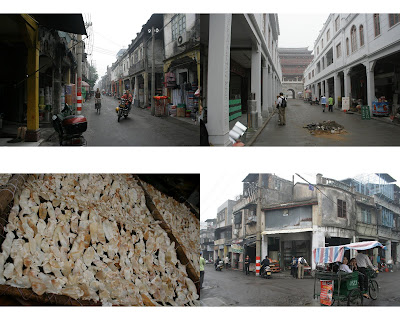Chaozhou
The city is surrounded by the
With so many historical places to visit, it was impossible to do all this in a day. The one place where many tourists visit was the Hanjiang Wall, dating back from the Ming Dynasty. The ancient city wall is Chaozhou’s greatest pride. In the past, this lofty wall prevented the ancient city from flooding by the
 Inside the city wall. Bottom left are fish floats drying in the sun.
Inside the city wall. Bottom left are fish floats drying in the sun. L to R: , Shop selling some local sweet, Me on top of city wall,
L to R: , Shop selling some local sweet, Me on top of city wall,looking down at the Xiangzi Bridge, remains of the old city wall
Opposite the wall is the
 L to R: Looking down into the city from top of city wall, taking a nap, outside Hanwen Shrine, Flowers on the side walk
L to R: Looking down into the city from top of city wall, taking a nap, outside Hanwen Shrine, Flowers on the side walkHan Yu governed Chaozhou for 8 months before he left for the Capital. The mountain (Han Shan) and river (Han Jiang) were named after his surname Han. Hanwen Shrine on Hanshan was also built in his honour.

Bottom: City wall on the left
 L to R: Xiangzi Bridge across the river opposite the city wall, Looking down from Hanwen Shrine
L to R: Xiangzi Bridge across the river opposite the city wall, Looking down from Hanwen ShrineTeochew is primary spoken here. The Teochew are a subgroup of the Han people who lived in the eastern coast of
These people traditionally were involved in smuggling, piracy and illegal emigration and sometimes known as the Jews of China. Whenever I get cheeky, I always teased my wife over it.
My in-laws felt so at home in this city and was at ease chattering with the locals in their dialect. It is not uncommon that a Teochew person addresses other Teochew as ga-gee-nung, which means "my people" in the Teochew language.
The city has so much to offer and it is a pity to only see a part of it. It has so much to offer and I hope to come back again especially to savour the food.
The one thing that soured this trip was the beggars. A word of advice – do not give them any money. When we alighted from our bus we were accosted by a blind musician accompanied by a lady. My SIL being kind hearted gave them some money. Instead of being grateful, they continued to hound all of us, following us everywhere, expecting all of us to give them money. Before long more beggars came surrounding us. It became intolerable that we have to seek refuge in
Later, the locals told us these beggars are a syndicate of people hiring blind people, babies, crippled or deformed children to make money out sympathetic tourists. It was disgusting to hear that and I wish the local council or police would do something about it before tourists are driven away.


0 Comments:
Post a Comment
<< Home